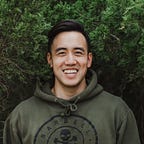5th grade. Conway, Arkansas. I’m walking home with one of my friends after school. We pass by a bus stop where a bus was picking up students to take home. And as we walk by, I see a hand reach out the window and point at me.
“Look! It’s Jackie Chan!”
“Ching ching chong chong”
More hands pointed out the window. More jokes and laughter followed.
My friend, oblivious to what I was feeling, joined in with the laughter.
But what was I feeling? I didn’t know, but it didn’t feel good. I had more questions than anything.
Why do people pick on me? What’s wrong with being Asian? Why is that a bad thing?
I grew up in Dallas, Texas. My family was one of many other Chinese families in church, school, and the city in general. So I was surrounded by people that looked like me, spoke like me, and grew up like me. My family friends were Chinese, I had plenty of Asian friends. I attended Chinese school and all the church events. On top of that, there’s a well established Asian community in Dallas. So there were always Asian restaurants and groceries available. Yes, I was still a minority in society, but I was never faced with racial tension. Being Asian was fine. Normal. Comfortable.
I also spent a few years of my childhood in Conway, Arkansas. My family was one of a few other Chinese families in this small town and I was the one Asian guy at my school. People began to notice I was different. My looks and skin color invited a lot of attention. I was short, chubby, wore thick glasses, and overall just looked really out of place. I started getting picked on a lot. From subtle jokes to blatant insults, getting bullied became normal for me. Any resistance I showed was quickly put down with a threat or physical response. I learned to be silent in order to survive. To just take it in and bury it. I began to hate who I was. I knew I looked different, but why was that a bad thing?
Needless to say, when my family moved back to Dallas, I did my best to forget my experience in Arkansas. I dove headfirst back into the Asian bubble, and I don’t see that as a bad thing. I finally felt like I belonged. I wasn’t a bag of stereotypes anymore. I was comfortable again.
However, in the past few years, these memories have resurfaced as I’ve learned more about who I am as an Asian American and how the world views people like me. I share this part of my story because these experiences have been crucial in shaping who I am today. I have felt what it is like to be discriminated against, to be viewed as less than. And my heart has become soft for those who go through the same. I understand.
There have been, and still are, injustices that Asian Americans face. And there have also been, and still are, injustices that all kinds of people face.
In no way am I saying that what I went through was the threshold of discrimination and injustice. In no way am I saying that my experience was the worst of the worst.
No. I was a kid. And those who attacked me were also kids. Child’s play. It has been good to process and learn from those experiences. But I’m sure we’ve all come to realize that the world is far more messy and broken than a classroom.
I’ve only tasted a sample of the bitterness and sorrow that other people are forced to bite into at the table of discrimination. But the fact I was able to go through some, if any, level of discomfort in that regard is something I will always treasure. Because I’ve seen a small glimpse into what other people face today. And it breaks my heart.
Kyle Korver recently wrote a piece for The Players’ Tribune about his experience with racism as a white man. And while a white man’s experience with race is much different from an Asian American’s, his awareness of his own privilege is something that cut deep in my heart. If I could quote the entire article, I would. But this is one quote that rings so true for me:
“I’m still in this conversation from the privileged perspective of opting in to it. Which of course means that on the flip side, I could just as easily opt out of it. Every day, I’m given that choice — I’m granted that privilege…”
Asian Americans face injustice. But a majority of Asian Americans are also so privileged. I never had to worry about money, education, or getting a job. I never had to worry about where my next meal would come from or if I would pay my bills on time. I am so privileged. And that is not a bad thing! But what I deeply relate to Kyle Korver is that I don’t have to engage with racial injustice. I don’t have to think about it.
I don’t have to care.
But with this privilege comes a power. A power to step in. But also a power to just listen. Because for a lot of people, they don’t have that privilege. They have to face injustice. They have to deal with discrimination. It’s not a choice, it’s a fight.
I want to speak up for my fellow Asian Americans and share my thoughts. I want to fight racial injustice. But I realize that I know next to nothing about the experiences and emotions of Asian Americans, or even all minorities, with injustice today. For me the first step is not to just share my story , but to listen to others’ stories as well. To hear their voices. To just have conversation.
So this is me taking a step. This is me opting in.
